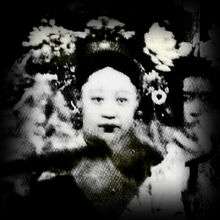Consort Jin
| Consort Jin 瑾妃 | |||||
|---|---|---|---|---|---|
 Consort Jin | |||||
| Born | 1873 | ||||
| Died | 1924 (aged 50–51) | ||||
| Spouse | Guangxu Emperor | ||||
| |||||
| House |
Tatara (by birth) Aisin Gioro (by marriage) | ||||
| Father | Changxu | ||||
| Consort Jin | |||||||
| Chinese | 瑾妃 | ||||||
|---|---|---|---|---|---|---|---|
| |||||||
| Imperial Noble Consort Wenjing | |||||||
| Traditional Chinese | 溫靖皇貴妃 | ||||||
| Simplified Chinese | 温靖皇贵妃 | ||||||
| |||||||
Imperial Noble Consort Wenjing (1873–1924), better known as Consort Jin, was a consort of the Guangxu Emperor, the penultimate emperor of the Qing dynasty and imperial China. Her younger sister, Consort Zhen (1876–1900), was also a consort of the Guangxu Emperor.
Life
Consort Jin was born in the Manchu Tatara clan (他他拉氏) as a daughter of Changxu (長敘), who served as a you shilang (右侍郎; Right Vice-Secretary) of the Ministry of Revenue. Her personal name is unknown. Her grandfather, Yutai (裕泰), was a former Viceroy of Shaan-Gan. Her uncle, Changshan (長善), served as General of Guangzhou (廣州將軍).
Lady Tatara entered the Forbidden City in 1889 at the age of 13 and was awarded the title "Imperial Concubine Jin" (瑾嬪). Her younger sister, who also entered the Forbidden City at the same time as her, became "Imperial Concubine Zhen" (珍嬪). In the spring of 1894, both of them were promoted to the rank of Consort (妃) during Empress Dowager Cixi's 60th birthday celebrations. The Jadeite Cabbage sculpture, which is now on display in Taiwan's National Palace Museum, is believed to be part of the dowry settlement.[1] The Guangxu Emperor did not really like her and instead favoured her younger sister.
In 1894, Consort Jin's younger sister, Consort Zhen, was discovered to have abused her influence over the Guangxu Emperor by interfering in civil appointments.[2] Consort Jin was implicated and demoted along with her sister by Empress Dowager Cixi. The empress dowager also ordered the execution of a palace eunuch who collaborated with Consort Zhen. Zhirui, a cousin of the two consorts who served as an official, was banished from Beijing.[3] The two sisters were restored to the rank of Consort later on. However, Consort Zhen was placed under house arrest.[4]

When the Eight-Nation Alliance invaded Beijing in 1900, the imperial court fled from the Forbidden City to Xi'an. They apparently forgot about Consort Jin and left her behind, but she was saved by a noble and brought to Xi'an later. Consort Zhen, on the other hand, died after being thrown into a well, allegedly on Empress Dowager Cixi's order.
When the imperial court returned to Beijing in 1902, the Qing dynasty had lost its influence. The Guangxu Emperor died six years later in 1908, followed by Empress Dowager Cixi, who died one day after the emperor. Before her death, Cixi named Zaifeng (Prince Chun)'s son, Puyi, as the new emperor. The Guangxu Emperor's empress, Empress Longyu, became Empress Dowager while Consort Jin became Dowager Consort Jin.
Puyi, the Last Emperor, had five other adoptive mothers in addition to his own biological mother, Princess Consort Chun. Among the five, Empress Dowager Longyu ranked the highest while Dowager Consort Jin was the lowest. The other three, Consort Zhuanghe, Consort Jingyi and Consort Ronghui were former consorts of the Tongzhi Emperor, the Guangxu Emperor's cousin and predecessor.
In 1912, Empress Dowager Longyu signed the abdication documents on behalf of Puyi, bringing an end to the Qing dynasty. The empress dowager died a few months later in 1913, and Dowager Consort Jin became the highest ranked woman in the palace. She was honoured by the title "Dowager Consort Duankang" (端康太妃). In 1921, Puyi's birth mother, Princess Consort Chun, committed suicide by swallowing opium after being publicly reprimanded by Dowager Consort Duankang for her son's misbehaviour.
Puyi wrote in his autobiography that Dowager Consort Duankang saw Empress Dowager Cixi as a role model even though Cixi was responsible for the death of her younger sister, Consort Zhen. Dowager Consort Duankang's strictness often angered the young emperor Puyi, but she softened her approach towards him after his birth mother died.
When the time came for Puyi to marry, Dowager Consort Duankang and Dowager Consort Jingyi had an argument over who should be the empress (the emperor's primary spouse). Duankang favoured Wanrong while Jingyi preferred Wenxiu. In Duankang's opinion, Wenxiu was not beautiful enough to be empress and she came from a lesser family background as compared to Wanrong. Despite so, Puyi's first choice was Wenxiu, and this frustrated Duankang. She held a discussion with other nobles and officials in the imperial court, and they succeeded in persuading Puyi to select Wanrong as his empress and name Wenxiu as a consort.
Dowager Consort Duankang died in 1924 in the palace just before Puyi was forced to leave the Forbidden City.
Titles
- Imperial Concubine Jin (瑾嬪), from 1888 to 1894.
- Consort Jin (瑾妃), in 1894.
- Noble Lady Jin (瑾貴人), from 1894 to 1895.
- Consort Jin (瑾妃), from 1895 to 1908.
- Emperor Father's Noble Consort Jin (兼祧皇考瑾貴妃), from 1908 to 1912.
- Imperial Noble Dowager Consort Duankang (端康皇太妃), from 1912 to 1924.
- Imperial Noble Consort Wenjing (温靖皇贵妃), posthumous title.
See also
References
- ↑ Leslie Hook. "The Jade Cabbage" Wall Street Journal. 27 July 2007. Retrieved 21 November 2010.
- ↑ Kwong, Luke S.K. A Mosaic of the Hundred Days: Personalities, Politics and Ideas of 1898 (Harvard University Press; 1984) pg. 60
- ↑ Kwong, pg. 60
- ↑ Kwong, pg. 61